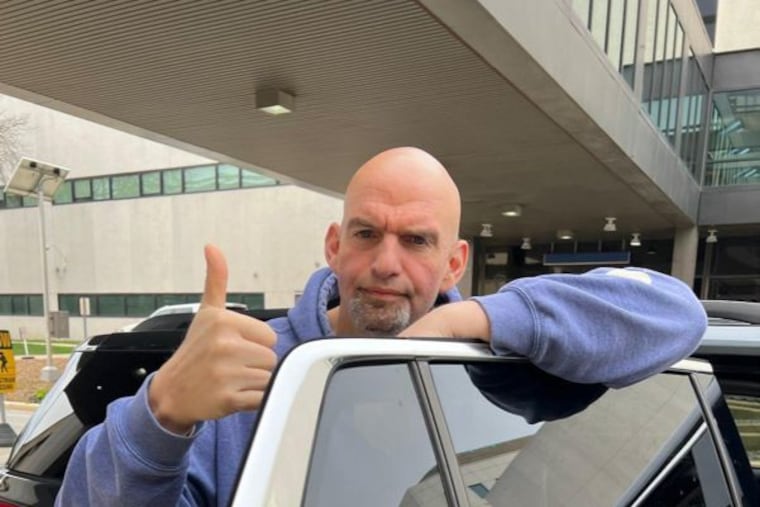Sen. John Fetterman has been released from the hospital after treatment for depression
The Pennsylvania Democrat was hospitalized for major depression at Walter Reed National Military Medical Center in mid-February. His office also released new details Friday about his health.

Sen. John Fetterman was released from the hospital Friday after six weeks of inpatient treatment for clinical depression and returned to his home outside of Pittsburgh, his office announced.
The Pennsylvania Democrat was hospitalized for major depression at Walter Reed National Military Medical Center in mid-February. Fetterman’s depression is now in remission, according to a news release from his office that also disclosed new details from a doctor about his health — including about his heart condition and ongoing recovery from the stroke he suffered in May.
“I am so happy to be home. I’m excited to be the father and husband I want to be, and the senator Pennsylvania deserves,” Fetterman said in a statement. “I will have more to say about this soon, but for now I want everyone to know that depression is treatable, and treatment works.”
Fetterman is expected to return to the Senate the week of April 17, his office said this week. The Senate will be in recess for the next two weeks beginning Monday, and Fetterman will return when the chamber resumes work.
Fetterman will appear on CBS Sunday Morning for an interview with lead anchor Jane Pauley. The pair spoke earlier this week in Bethesda, Md., where Walter Reed is located, and the interview will air at 9 a.m. Sunday.
“It’s like you just won the biggest, you know, race in, in the country. And the whole thing about depression is, is that objectively, you may have won,” Fetterman tells Pauley in a preview clip of the interview released Friday. “But depression can absolutely convince you that you actually lost. And that’s exactly what happened. And that was the start of a downward spiral.”
The announcement of Fetterman’s return home included new details about his health that were attributed to physician David Williamson, the neuropsychiatry chief and medical director at Walter Reed who oversaw the senator’s care.
Fetterman’s symptoms of depression became worse in the two months prior to his hospitalization, the release said. He wasn’t talking much and moved slowly, had low energy and motivation, and felt a sense of worthlessness. He did not have suicidal thoughts, according to the statement.
Eventually, the senator stopped eating and drinking, which reduced his blood pressure and can cause low blood flow to the brain.
Fetterman’s depression was treated with medication, and Williamson reported improvement during the six-week hospital stay. The senator’s mood improved, and he engaged with others more, and ate and drank well. While at the hospital, the release said, Fetterman read a book about depression to better understand the disorder.
“He expressed a firm commitment to treatment over the long term,” Williamson described in his discharge briefing, according to Fetterman’s office.
» READ MORE: Depression can get better. These four Philadelphians are living proof.
A week before his admission to Walter Reed, Fetterman spent a couple of nights at George Washington University Hospital after checking himself in with light-headedness. The hospital found no new stroke at the time.
In Fetterman’s discharge briefing, Williamson said that they couldn’t find evidence of a new stroke and said the senator’s neurological condition was the same as previous assessments.
The summary of the discharge briefing also provided new information about Fetterman’s heart. A few weeks after Fetterman’s May 2022 stroke, his campaign released a letter from Allegheny County cardiologist, Ramesh Chandra. In the letter, Chandra said that he diagnosed the senator with a common type of irregular heart rhythm called atrial fibrillation (A-fib) in 2017.
One of the risks of A-fib is that because a part of the heart is not contracting in unison, blood clots can form inside the heart’s chambers. Fetterman was prescribed medications but, according to the June letter, he stopped taking them and didn’t follow up with his physician for five years.
Chandra also diagnosed Fetterman with cardiomyopathy, a term that describes multiple conditions that affect the ability of the heart muscle to pump blood as it should.
» READ MORE: Fetterman’s health issues date back at least to 2017. Here’s an overview.
Fetterman’s office on Friday provided details from Williamson noting that his left ventricular ejection fraction, a measure of how much blood the chamber of the heart pumps to the body, was 50-55%. A low ejection fraction is an indicator of heart failure. Measures between 50% and 70% are considered normal, according to the American Heart Association.
The statement also noted that there were no blood clots in his heart.
Finally, Fetterman has been struggling with auditory processing issues since his stroke. While at the hospital, physicians identified hearing loss in both ears and the senator was fitted for hearing aids.
”With improvement in his depression, improvement in the patient’s speech abilities was noticeable and we believe that significant continued improvement is likely with continued outpatient rehabilitation,” the statement attributed to Williamson read.